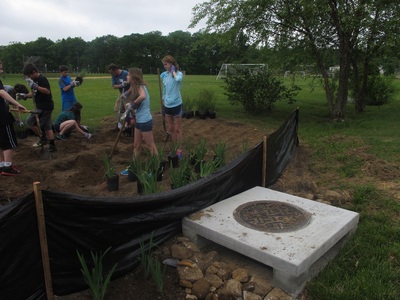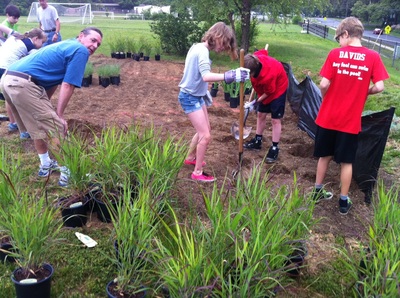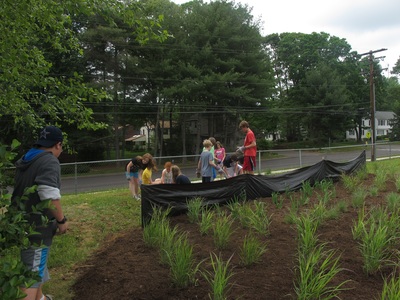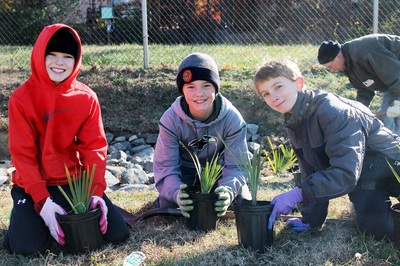Systemic Sustainability: 1.1 Curriculum and Instruction
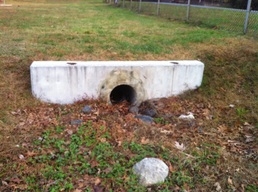 A Rain Garden site before planting
A Rain Garden site before planting
On Campus: Rain Gardens
Background Information:
Planning began, involving AACPS Facilities, and the help of a Watershed Steward, John Dawson. A STEM grant from Northrup Grumman was awarded. In the spring of 2013, it was time to begin planting the seeds of knowledge with students. Borrowing a storm water model from Arlington Echo, the concepts began to come to life for students. Mr. Dawson addressed the class on more than one occasion to share his knowledge and help Mrs. Sparby implement an activity in which the students were tasked to create a garden design and plan, with respect to the available native plants and the objective of the garden always at the forefront. They learned about what constitutes a rain garden – the components, the kinds of plants, the purpose and functionality.
Planting was completed in shifts, with each class heading outside at the regularly appointed time. They worked hard digging, weeding, planting, mulching, watering. Given the number of students involved and the size of the campus, additional tasks were undertaken that benefited the Bay. Students collected trash and recyclables left on the grounds. They weeded and mulched close to 100 existing trees that had not been tended to for far too long. They did this knowing that the campus is connected to the Bay, via the Severn River, and pollution control and restoring habitats are needed to protect the river and Bay. A “No Mow Zone” was created around the newly installed garden, further serving the Watershed.
Current Sustainability:
Success breeds success. The triumph of that project gave root to additional service learning project plans, necessitating more funding, again from the PTO, as well as grants from Unity Gardens and the Chesapeake Bay Trust.
Being awarded the grants was integral to the actual implementation of two additional rain gardens at SPMS. With a whole new crop of eager students, these gardens were installed on the opposite end of campus. Students were fascinated to learn that this part of the campus flows into a different river, the Magothy, compared to the back of the school, which drains into the Severn, despite the fact that the Severn is much closer.
Partnerships make the maintenance of these projects possible. Mr. Dawson, Watershed Steward, returns each year to help with planning, classroom instructional activities, and planting with students.
Background Information:
Planning began, involving AACPS Facilities, and the help of a Watershed Steward, John Dawson. A STEM grant from Northrup Grumman was awarded. In the spring of 2013, it was time to begin planting the seeds of knowledge with students. Borrowing a storm water model from Arlington Echo, the concepts began to come to life for students. Mr. Dawson addressed the class on more than one occasion to share his knowledge and help Mrs. Sparby implement an activity in which the students were tasked to create a garden design and plan, with respect to the available native plants and the objective of the garden always at the forefront. They learned about what constitutes a rain garden – the components, the kinds of plants, the purpose and functionality.
Planting was completed in shifts, with each class heading outside at the regularly appointed time. They worked hard digging, weeding, planting, mulching, watering. Given the number of students involved and the size of the campus, additional tasks were undertaken that benefited the Bay. Students collected trash and recyclables left on the grounds. They weeded and mulched close to 100 existing trees that had not been tended to for far too long. They did this knowing that the campus is connected to the Bay, via the Severn River, and pollution control and restoring habitats are needed to protect the river and Bay. A “No Mow Zone” was created around the newly installed garden, further serving the Watershed.
Current Sustainability:
Success breeds success. The triumph of that project gave root to additional service learning project plans, necessitating more funding, again from the PTO, as well as grants from Unity Gardens and the Chesapeake Bay Trust.
Being awarded the grants was integral to the actual implementation of two additional rain gardens at SPMS. With a whole new crop of eager students, these gardens were installed on the opposite end of campus. Students were fascinated to learn that this part of the campus flows into a different river, the Magothy, compared to the back of the school, which drains into the Severn, despite the fact that the Severn is much closer.
Partnerships make the maintenance of these projects possible. Mr. Dawson, Watershed Steward, returns each year to help with planning, classroom instructional activities, and planting with students.
|
Grants in excess of $5,000 were awarded in support of these projects by:
|
Summary Materials:
|
